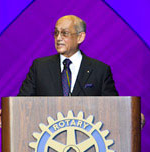March 2012 Message from R.I President Kalyan Banerjee
My dear brothers and sisters in Rotary,
In the first message I wrote for this magazine, last July, I quoted Mohandas K. Gandhi, who said, “You must be the change you wish to see in the world.” And in the months since, I have had incredible opportunities to travel the Rotary world and see how Rotarians everywhere are bringing those words to life.
Creating positive change means, at its simplest, using our knowledge and resources to solve a problem. But when we are talking about solving humanitarian problems in a real and lasting way, knowledge and ideas and resources are not enough to ensure results. We have to remember something else that is no less important: sustainability.
A sustainable solution is one that will continue to work even after the Rotarians who proposed and facilitated it are gone. This means that even though the project might have come from Rotary originally, the community will take ownership of it. That, of course, means that when a part breaks on a water pump, there will be a process in place to repair it and to keep that pump functional – carried out by the community, and without further recourse to Rotary.
The first step toward sustainability is understanding the need – for example, the cooking fuel problem common in much of the developing world. In many regions, solar ovens are a wonderful solution: They are inexpensive; they rely on a source of energy that is free, nonpolluting, and inexhaustible; and they are simple to use and maintain.
But before we step into a community and attempt to solve its fuel problem with solar ovens, we have to fully understand its situation – and look beyond the problem we see. Perhaps the local foods need to be cooked at a temperature higher than the solar oven can provide. Perhaps the area is windy, and the solar ovens would blow away. Perhaps it’s traditional in that area to begin cooking before dawn, which, of course, you cannot do with a solar oven. These are issues you simply might not have thought of, but that could soon lead to the solar ovens being used to patch roofs or keep animal feed dry instead of for cooking.
If we are trying to bring about change, it’s not enough to say, “My way is the better way.” We have to be listening and watching, not just talking. We can only help others if we reach out with an open mind – and with the knowledge, the commitment, and the perseverance to deliver on what we promise.
Download the website sponsorship guide

